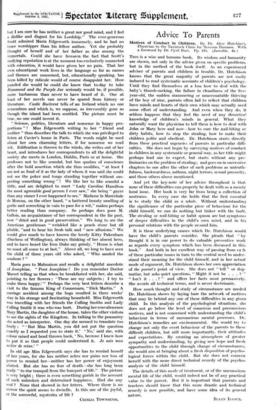Advice To Parents
Motives of Conduct in Children. By Dr. Alice Hutchison, Physician to the Tavistoek Clinic for Nervous Diseases. With
a foreword by Dr. Cyril Burt. Pp. 185. (Jarrolds. 6s.)
This is a wise and humane book. Its wisdom and humanity are shown, not only in the advice given on specific problems, but in the method of the book itself. As an experienced adviser of parents and children in trouble, Dr. Hutchison knows that the great majority of parents are not easily induced to read systematic accounts of children's psychology. Until they find themselves at a loss how to deal with the baby's thumb-sucking, the failure in cleanliness of the five- year-old, the sudden stammering or unaccountable thieving of the boy of nine, parents often fail to reflect that children have minds and hearts of their own which may actually need some effort of understanding. And even when they do, it seldom happens that they feel the need of any theoretical knowledge of children's minds in general. What they
naturally want the physician to tell them is how to deal with John or Mary here and now—how to cure the nail-biting or dirty habits, how to stop the stealing, how to make their children polite and obedient. Dr. Hutchison starts directly from these practical urgencies of parents in particular diffi- culties. She does not begin by surveying motives of conduct in children in any systematic or general way, as her title might perhaps lead one to expect, but starts without any pre- liminaries on the problem of stealing; and goes on in successive chapters to one after the other of such problems as untruth- fulness, backwardness, asthma, night terrors, sexual precocity, and those others above mentioned.
And yet the key-note of her advice throughout is that none of these difficulties can properly be dealt with as a merely
local issue. Her book is very far from being a collection of nostrums. In every case she holds that the first essential is to study the child as a whole. Without understanding the significance of the particular piece of behaviour for the child himself, we can do nothing but tinker with the fault. The stealing or nail-biting or habit spasm arc but symptoms of deeper difficulties in the child's own mind, and in his personal relations with the people around him.
It is these underlying causes which Dr. Hutchison would have the child's parents consider. She pleads that " by thought it is in our power to do valuable preventive work
as regards every symptom which has been discussed in this book." And both in her excellent way of passing from cash of, these particular issues in turn to the central need to under- stand their meaning for the child himself, and in her actual mode of argument, Dr. Hutchison shows her own appreciation of the parent's point of view. She does not " tell " or dog-
matize, but asks quiet questions, " Might it not be . . ? " " Isn't it . . ? " and offers her facts most persuasively. She avoids all technical terms, and is never doctrinaire.
How much thought and study of circumstance are needed Dr. Hutchison shows by laying bare the network of motives that may lie behind any one of these difficulties in any given child. In this analysis of the psychological situations, she does not go below the level of conscious and preconscious motives, and is not concerned with understanding the child's behaviour in terms of unconscious mental processes. Dr. Hutchison's remedies are environmental. She would try to change not only the overt behaviour of the parents to these difficult children, but still more importantly, their attitudes and expectations. By creating an atmosphere of greater sympathy and understanding, by giving new hope and fresh opportunities to the child through change of circumstances, she would aim at bringing about a fresh disposition of psycho- logical forces within the child. But she does not concern herself with the more direct technical remedy of the psycho- analysis of the child himself.
The details of this mode of treatment, or of the unconscious mental life of the child, would indeed not be of any practical value to the parent. But it is important that parents and teachers should know that this more drastic and technical remedy is now possible, and have some idea of its general nature. SUSAN ISAACS.










































 Previous page
Previous page